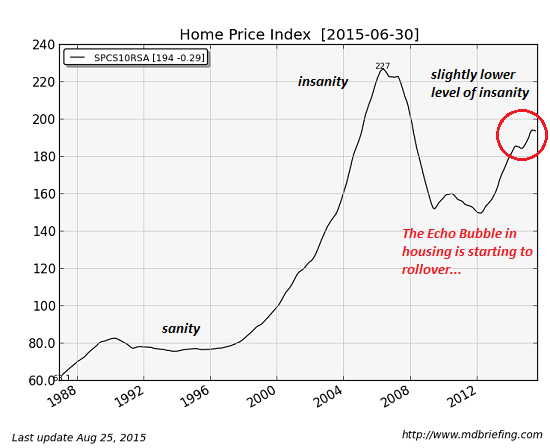 Uh oh – here we go again. Do you remember the subprime mortgage meltdown during the last financial crisis? Well, now a similar thing is happening with auto loans. The auto industry has been doing better than many other areas of the economy in recent years, but this “mini-boom” was fueled in large part by customers with subprime credit. According to Equifax, an astounding 23.5 percent of all new auto loans were made to subprime borrowers in 2015. At this point, there is a total of somewhere around $200 billion in subprime auto loans floating around out there, and many of these loans have been “repackaged” and sold to investors. I know – all of this sounds a little too close for comfort to what happened with subprime mortgages the last time around. We never seem to learn from our mistakes, and a lot of investors are going to end up paying the price.
Uh oh – here we go again. Do you remember the subprime mortgage meltdown during the last financial crisis? Well, now a similar thing is happening with auto loans. The auto industry has been doing better than many other areas of the economy in recent years, but this “mini-boom” was fueled in large part by customers with subprime credit. According to Equifax, an astounding 23.5 percent of all new auto loans were made to subprime borrowers in 2015. At this point, there is a total of somewhere around $200 billion in subprime auto loans floating around out there, and many of these loans have been “repackaged” and sold to investors. I know – all of this sounds a little too close for comfort to what happened with subprime mortgages the last time around. We never seem to learn from our mistakes, and a lot of investors are going to end up paying the price.
Everything would be fine if the number of subprime borrowers not making their payments was extremely low. And that was true for a while, but now delinquency rates and default rates are rising to levels that we haven’t seen since the last recession. The following comes from Time Magazine…
People, especially those with shaky credit, are having a tougher time than usual making their car payments.
According to Bloomberg, almost 5% of subprime car loans that were bundled into securities and sold to investors are delinquent, and the default rate is even higher than that. (Depending on who’s counting, delinquency is up to three or four months behind in payments; default is what happens after that). At just over 12% in January, the default rate jumped one entire percentage point in just a month. Both delinquency and default rates are now the highest they’ve been since 2010, when the ripple effects of the recession still weighed heavily on many Americans’ finances.
…click on the above link to read the rest of the article…








